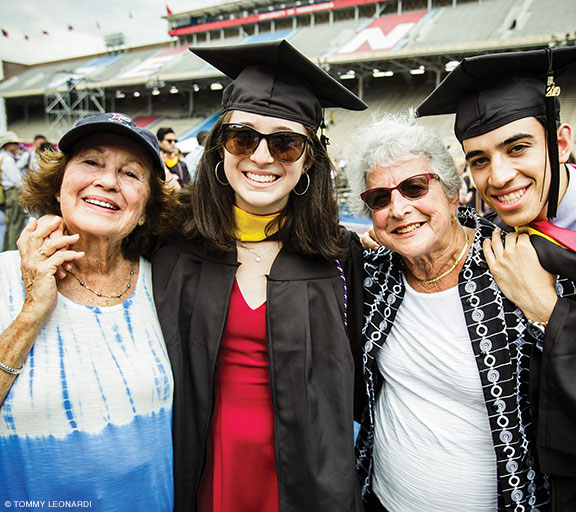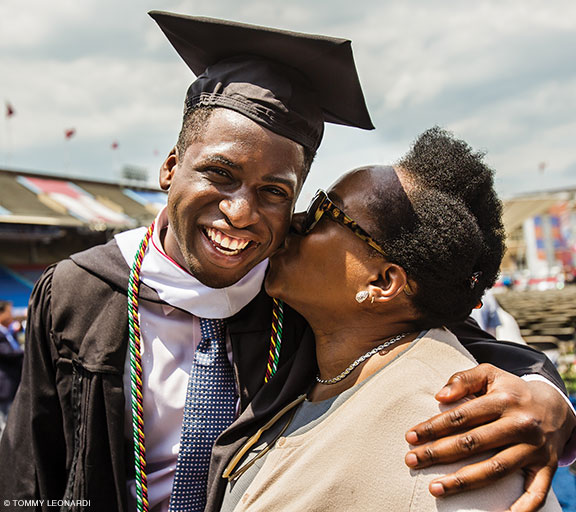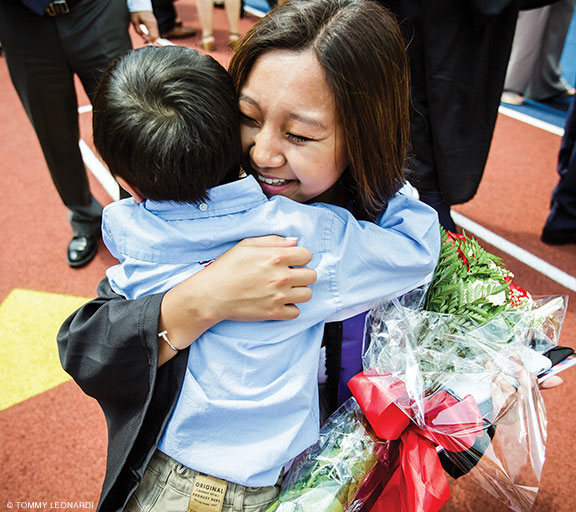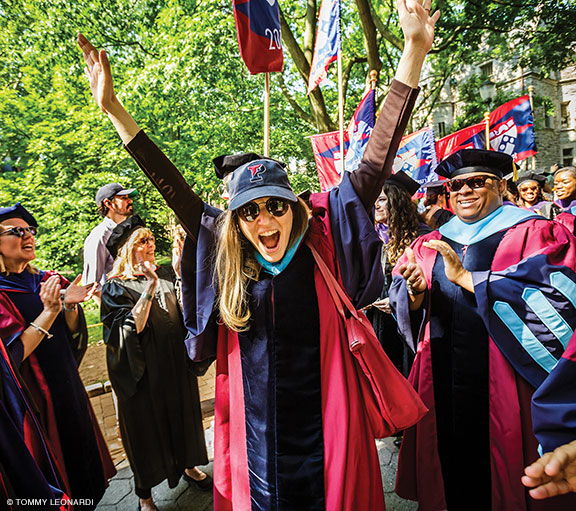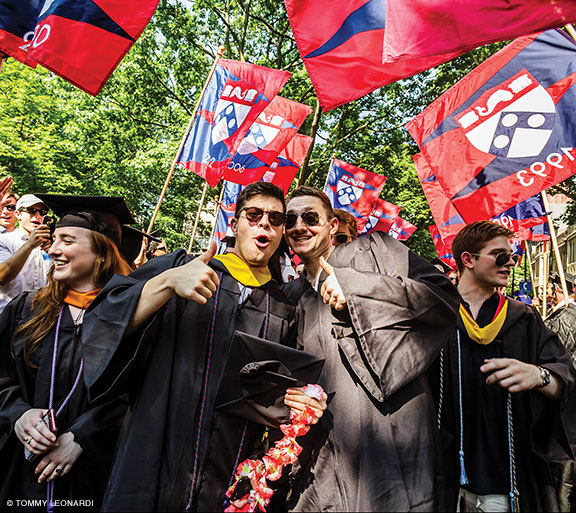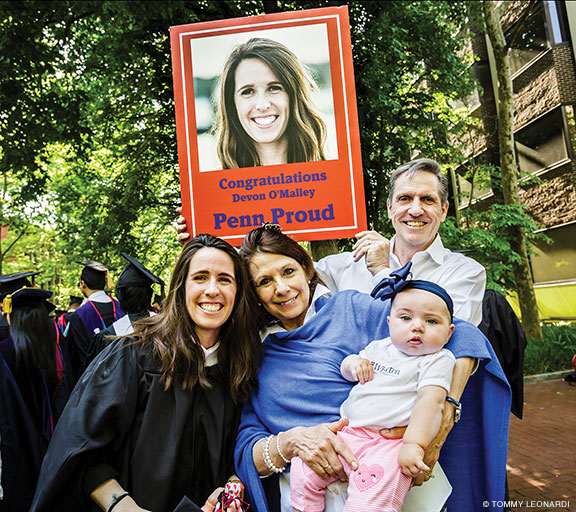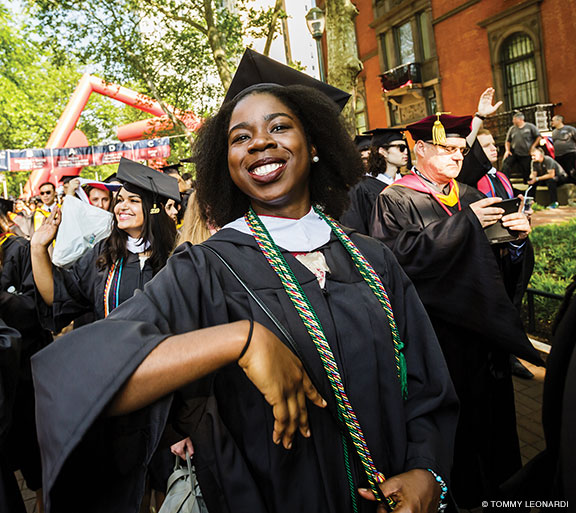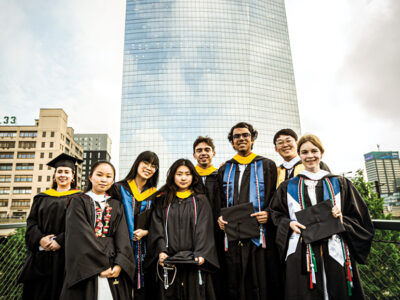Social justice activist challenges graduates to fight narratives, be uncomfortable, and always remain hopeful.
Bryan Stevenson didn’t waste any time making a bold request of Penn’s Class of 2019. “I could spend my time just kind of affirming all of the great things you’ve done, but I really came with a different purpose,” the criminal justice reform advocate said less than a minute into his address at the University’s 263rd Commencement. “I’ve come today to ask you to join me, and the many people on this platform, in changing the world.”
It’s a cliché, perhaps, that’s been told at graduation speeches before. But Stevenson came armed with a résumé to back it up, as well as a four-point blueprint of how such change might be possible—one final crash course for approximately 7,700 Penn graduates. His message to those sweltering inside caps and gowns on a warm mid-May morning at Franklin Field: be proximate to those who are suffering; change the narratives shaping political debates; remain hopeful; and don’t be afraid to be uncomfortable. “I didn’t come to talk about problems,” he said. “I came to talk about answers.”
Stevenson—the founder of the Equal Justice Initiative, a nonprofit organization committed to ending mass incarceration and challenging racial injustice—learned his first valuable lesson on the “power of proximity” from his grandmother, a “classic African American matriarch” who used to hug him so hard that he “thought she was trying to hurt me.” Afterwards, he recalled, she would always ask if he could still feel the hug. Many years later, when Stevenson went to see her on her deathbed, she told him, “Bryan, do you still feel me hugging you? I want you to know I’m always going to be hugging you.” Whenever Stevenson gets overwhelmed by his work, he thinks about his grandmother’s last words to him—and how meaningful a warm embrace can be for people who are suffering. “At a very minimum,” he said, “if you can get close enough and wrap your arms around someone and affirm their humanity, you should.”
While solving the world’s biggest problems can’t be done, he said, if people “stay isolated” from the nature of those problems, Stevenson also noted that the narratives surrounding certain issues need to change too. “We’re going to have to fight against the politics of fear and anger,” he said, arguing that the mass incarceration he’s been working to change was in large part due to a “misguided war on drugs” from politicians. “I actually believe fear and anger are central ingredients of injustice and oppression.”
People also need to change the way race is discussed, Stevenson argued. “It’s almost like we’ve turned the Civil Rights era into a three-day carnival,” he said. “On day one, Rosa Parks didn’t give up her seat on a bus. On day two, Dr. King led a march on Washington. And on day three, we changed all the laws and racism was over.” But the wounds of segregation, which some of his own family members had to endure, were never properly treated, he said. “I hope you are the generation that leads us into an era defined by truth and reconciliation,” added Stevenson, pointing out that other countries like South Africa, Rwanda, and Germany do a better job than the US in recognizing their own past atrocities.
Through everything, Stevenson urged graduates to stay hopeful because “I believe hopelessness is the enemy of justice,” he said. “We cannot achieve the change we seek if we don’t hold onto hope. I actually believe injustice prevails where hopelessness persists. Our hope is our superpower.” He encouraged everyone to go back and read their college admission essays to remind them to hold on to their wide-eyed aspirations even “when the world gets complicated” and cynicism threatens to break through.
And they have to try to feel that way, he said, while being “willing to do things that are uncomfortable and inconvenient.” He then told a story about an elderly man in a wheelchair who approached him after one of his talks—“covered in cuts and bruises and scars” that dated all the way back from when he tried to register African Americans to vote in Alabama in the 1960s. “These are my medals of honor,” the old man told him.
“When you stand when other people say sit down, and when you speak when others say be quiet, I’m going to be cheering for you,” Stevenson said, before concluding: “Change the world. We need you now.”
In her commencement address, Penn President Amy Gutmann struck a familiar chord, though delivered it in a slightly different package. Making several references to the popular HBO series Game of Thrones, which wrapped up its eight-season run a night earlier, Gutmann noted that “in the walls of ice, in the thrones of iron, we see a mirror of our times. We recognize our own world, where too many live for their tribe alone—where, too often, we listen only to those who think, look, and believe as we do.”
But that doesn’t have to be inevitable, Gutmann argued. The proverbial wall of ice can be shattered. The world can be changed. “From this world of differences, we can weave a tapestry of communities,” she said. Later, she reminded graduates that they all wove their own “rich tapestry of friends and memories at Penn,” while embracing a “more intellectually challenging, inclusive, and demanding world.”
“Now,” she added, “the task before you: Stay at the loom. Speak out and stand up. Weave together a world better, freer, and more inclusive.” —DZ
Honorary Degrees
Bryan Stevenson Honorary Doctor of Laws and 2019 Commencement Speaker
Jon Bon Jovi Honorary Doctor of Music
Temple Grandin Honorary Doctor of Sciences
Richard G. Lugar Honorary Doctor of Laws
Denis Mukwege Honorary Doctor of Sciences
Laurie Olin Honorary Doctor of Arts
Neville Earl Strumpf Honorary Doctor of Sciences
Jill Cornell Tarter Honorary Doctor of Sciences
Bios of honorands are at commencement.upenn.edu

